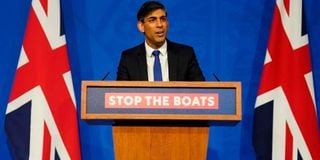UK Prime Minister Rishi Sunak calls for national election for July 4

Britain's Prime Minister Rishi Sunak hosts a press conference inside the Downing Street Briefing Room, in central London, on December 7, 2023, after Britain and Rwanda signed a new treaty to transfer illegal migrants to the African country.
What you need to know:
- Sunak's party trails opposition Labour badly in polls
- Early election is a risky strategy for Sunak
- PM hopes economic good news will boost his party's chances
- Conservative/Labour attack lines already drawn up
British Prime Minister Rishi Sunak called a national election for July 4 on Wednesday, saying Britons would be able to choose their future in a vote his Conservatives are widely expected to lose to the opposition Labour Party after 14 years in power.
Ending months of speculation as to when he would call a new vote, Sunak, 44, stood outside his Downing Street office in pouring rain and announced he was calling the election earlier than expected, a risky strategy with his party far behind Labour in the opinion polls.
Almost shouting to be heard above an anthem associated with the Labour Party played by protesters just outside the gates to Downing Street, Sunak listed what he said were his achievements in government, not only as prime minister but also as a former finance minister.
"Now is the moment for Britain to choose its future," he said, describing that choice as one between stability with him and the unknown with Labour leader Keir Starmer.
"Over the next few weeks, I will fight for every vote, I will earn your trust and I will prove to you that only a Conservative government led by me will not put our hard earned economic stability at risk."
In an attack on Labour, he said that Starmer, conversely, always took the "easy way out" and had no plan. "As a result, the future can only be uncertain with them," he said.
Sunak heads into the election not only far behind the Labour Party in the polls but also somewhat isolated from some in his party, increasingly dependent on a small team of advisers to steer him through what is set to be an ugly campaign.
But he seems to have decided with some economic gains, such as inflation falling and the economy growing at its fastest pace in almost three years, now was the time to take a risk and present his agenda for a new term formally to voters.
The former investment banker and finance minister took office less than two years ago, and since then has struggled to define what he stands for, becoming increasingly frustrated that what he sees as his successes have failed to be appreciated.
Attack lines
Both parties have all but kicked off campaigning for an election, with the attack lines on the economy and on defence already firmly drawn.
Sunak and his government accuse Labour of being poised to increase taxes if in government and that the party would not be a safe pair of hands for Britain in an increasingly dangerous world as it lacks a plan, charges the opposition denies.
Labour accuses the government of 14 years of economic mismanagement, leaving people worse off, with a series of chaotic administrations that have failed to give the stability businesses have craved to spur economic growth.
If Labour win the election, Britain, once known for its political stability, will have had six prime ministers in eight years for the first time since the 1830s.
Labour said before the announcement it was more than ready for an election.
"We are fully ready to go whenever the prime minister calls an election. We have a fully organised and operational campaign ready to go and we think the country is crying out for a general election," Labour leader Starmer's spokesperson told reporters.
Starmer kicked off his party's election campaign last week by pledging to "rebuild Britain", setting out the first steps he said Labour would take if it forms the next government.
Labour is running about 20 percentage points ahead of Sunak's Conservatives in the opinion polls but some party officials are concerned their advantage is not as solid as it appears, fearing many voters remain undecided.
Sunak might be aiming to capitalise on that uncertainty and also to wrongfoot Labour, which has still to complete the selection of all its parliamentary candidates, a party veteran said.
Sunak will also hope that some economic gains and the first flights in his centrepiece immigration plan of sending illegal asylum seekers to Rwanda might also boost his party's fortunes. The earliest possible date for those flights is June 24, 10 days before the election.
While some Conservatives welcomed the move to call an election, not all were happy.
"Death wish 2024," said one Conservative lawmaker on condition of anonymity.





